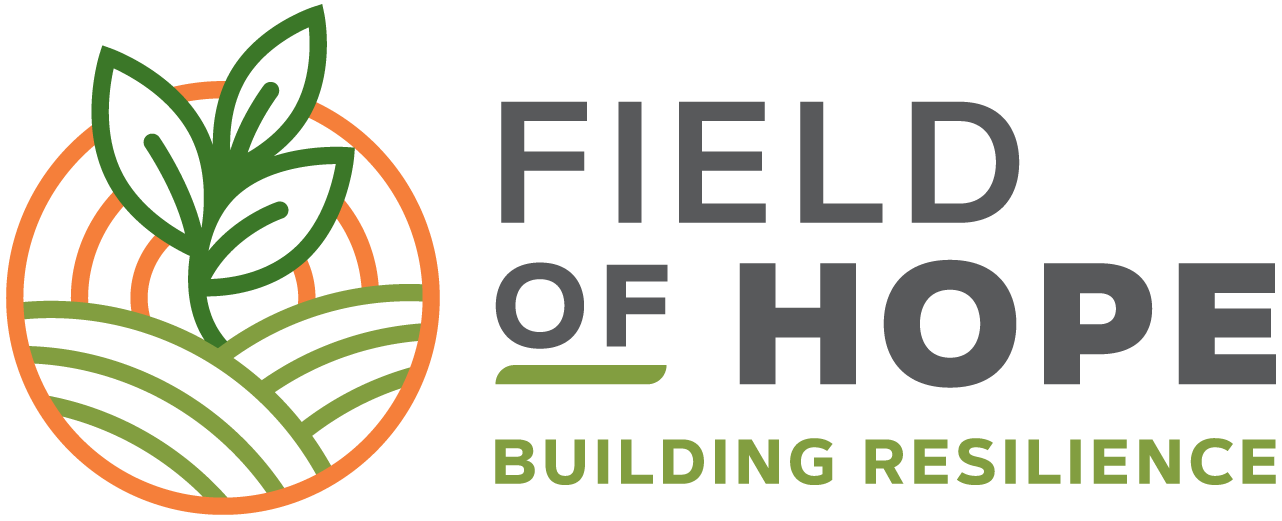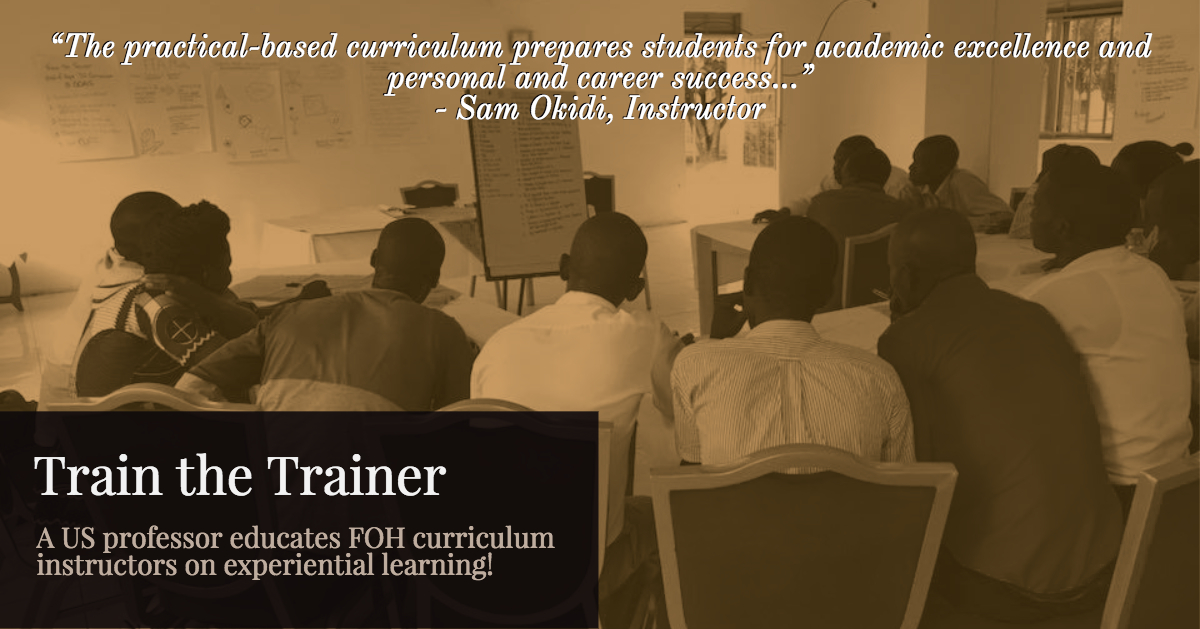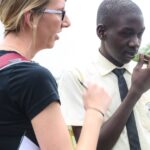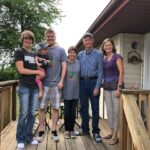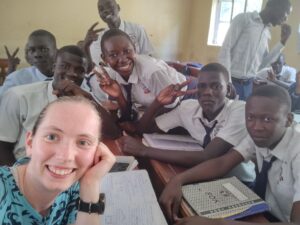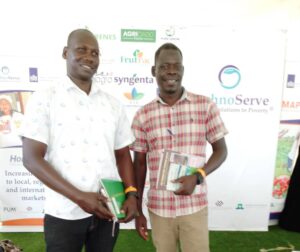Knowledge is power. Information is liberating. Education is the premise of progress, in every society, in every family.” Kofi Annan
Part of Field of Hope’s mission is to inspire students in agriculture – to motivate them to see agriculture not as a poor man’s job but as a business with strong potential.
Most teachers in Uganda learned and now teach by method of lecture. Research will tell you this is the least effective method of teaching. Sitting in a classroom and writing everything possible that comes from the lecturer’s mouth is not inspirational. It’s daunting and boring, and it becomes hard to see the purpose in what one is learning.
Through experiential learning, students are educated through first-hand experiences; classroom focus shifts from the teacher to the student. Experiential learning takes what students already know – what they see at home or on their walk to school – and relates it back to what they’re learning by creating opportunities for them to see the lesson first-hand.
Field of Hope, partnering with Vivayic, has been developing curriculum for secondary (high school equivalent) agriculture classes in Uganda that is formatted for the experiential learning style. S1 (freshman level) was piloted this year – what started as three instructors quickly jumped to 15 as instructors heard about this curriculum and how it teaches their students. Just as this learning style is new for Ugandan students, it is new for Ugandan instructors, too. As one can imagine, teaching from what you write on the chalkboard and teaching from involved projects with high school students are quite different methods. Our instructors needed an expert to help them make the shift from lecture to the experiential learning style of teaching.
Lucky for us, Kelly Huenink, the adult agriculture trainer extraordinaire, happened to be in Uganda. God had orchestrated the pieces perfectly.
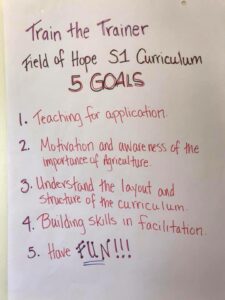
She said:
The processes of learning have been well-documented. Learning is not much different no matter where one is located in the world. However, teaching methods vary from country to country, culture to culture and teacher to teacher. We all have our favorite teacher, or teachers, and others who weren’t as good – even if they knew the content of the course well. Personally, I am humbled by my co-workers and their excellent teaching skills. I pale in comparison. Fortunately for me, I mainly teach adults in agriculture one-on-one, and that suits me well.
Recently, I worked with 15 Secondary Agriculture Teachers from almost as many High Schools in Northern Uganda. I had the help of Vivayic’s curriculum and staff to help prepare me for the two days of Train the Trainer that took place in late June in Lira through Field of Hope.
The first day, instructors volunteered to memorize paragraphs of the FFA Creed to recite later in the weekend. They all memorized their paragraphs! It was a great experience to hear them recite it. Tonny, an instructor, was challenged by the paragraph that talks about “less dependence on begging…”.
I know they all left with a greater understanding of the value of experiential learning (and that while lecture is the most common in Uganda, it is the least effective), how to utilize reviews and interest approaches, as well as gaining a deeper appreciation for the importance of agriculture. On the second day, instructors became familiar with the layout and structure of the curriculum (a scavenger hunt followed by a great discussion of their answers afterward). They also heard about project-based learning and the direction we’d like to see them heading with the upper-level students.
Some of the key ideas that they generated themselves were to 1). speak to their schools about eliminating the practice of using the gardens (digging) as punishment for students, 2). Giving each student a small plot if possible, 3). Using Bell Ringers to review the day before and to encourage them to be on time each day. The Bell Ringers come from the test review questions, and they keep a separate notebook for them.
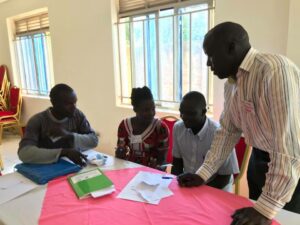
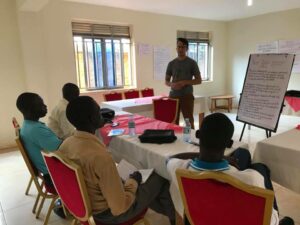
The training was deemed successful, as our instructors were not only equipped to effectively teach out of the curriculum, but they were excited!
Here’s what the instructors have to say about our curriculum:
Field of Hope’s curriculum is helpful because “it prepares students for academic excellence, personal and career success including self-employment, and the curriculum is practical-based.” – Sam Okidi, Amuca SDA
“It is better to use and incorporate because most of the activities are learner-centered and practical-based.” – Isaac Obote, Amuca SDA
Field of Hope’s curriculum is helpful because “it engages students in activities and learning is more practical because learners are also involved. It motivates the learner to learn and inspires them to work hard.” – Wilfred Obalim, Skyland HS
The curriculum “is more involved (participatory) for the learners, hence students understand better.” – Irene Amito, FOH Trainer
“It gives very interactive questions as guides to the teacher.” – Tony Aguma, Hope Secondary School
“The curriculum is helpful to teach agriculture because it presents precise and simple content to understand. It also points the most appropriate methods to use when presenting a particular lesson.” – Emmanuel Adyebo, Lira Integrated
Field of Hope’s curriculum “gives knowledge in the details.” –Mercy Alum, RG
